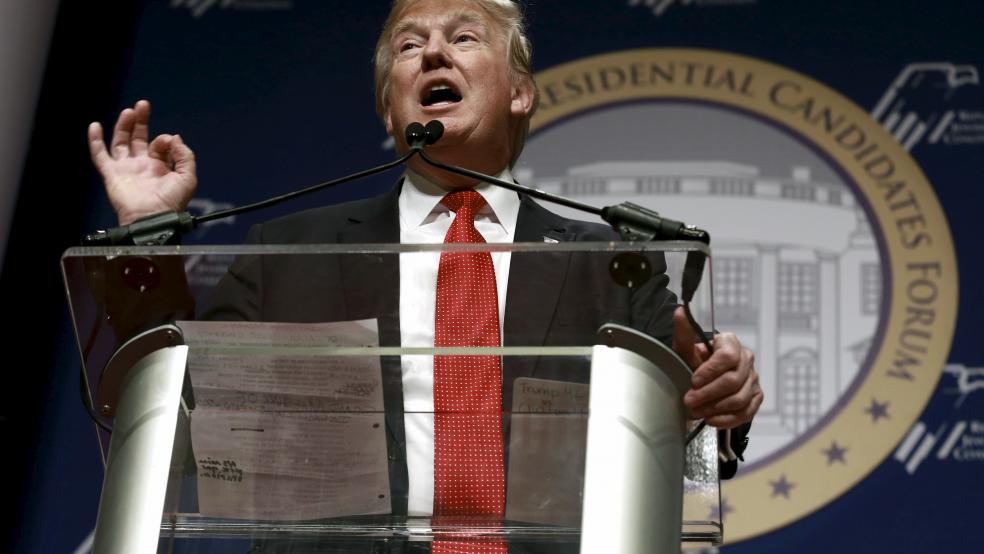Who knows, at this point, what effect Republican presidential frontrunner Donald Trump’s proposal to ban Muslims from entering the United States “until our country's representatives can figure out what is going on” will have on his standing in the polls. The candidacy of the former reality television star is, by all evidence, harder to kill than Rasputin.
However, the controversial plan Trump released Monday afternoon has drawn a stronger reaction, both from his fellow Republicans and from the media, than most of his other eyebrow-raising suggestions.
Related: Trump’s Call to Bar Muslims from the U.S. Could Destroy the GOP Brand
House Speaker Paul Ryan, the most powerful elected official in the Republican Party, expressed strong disagreement with Trump’s plan on Tuesday morning -- though oddly without once mentioning the billionaire’s name.
“Freedom of religion is a fundamental constitutional principle; it’s a founding principle of this country,” Ryan said at a House Leadership news conference. “Normally, I do not comment on what’s going on in the presidential election, I will take an exception today. This is not conservatism. What was proposed yesterday is not what this party stands for, and more importantly, it’s not what this country stands for.
“Not only are there many Muslims serving in our armed forces, dying for this country, there are Muslims serving right here in the House, working every day to uphold and to defend the Constitution. Some of our best and biggest allies in this struggle and fight against radical Islamic terror are Muslims.”
He noted that the overwhelming majority of Muslims in the world are peaceful and said that in a meeting with Republican representatives Tuesday, “I told our members this morning to always strive to live up to our highest ideals, to uphold those principles in the Constitution on which we swear every two years that we will defend.”
Related: Is Trump Leading a Genuine Political Movement?
Many of Trump’s fellow Republican presidential candidates criticized his plan, though with varying degrees of energy. Former Florida governor Jeb Bush used Twitter to call Trump “unhinged.”
South Carolina Sen. Lindsey Graham, in a play on Trump’s “Make America Great Again” slogan, blasted him on Twitter:
“You know how you make America great again? Tell @realDonaldTrump to go to hell” https://t.co/pBLaZ1kgUV
— Lindsey Graham (@LindseyGrahamSC) December 8, 2015
Trump’s plan was denounced by the Republican Party chairs in each of the three early-voting states of Iowa, New Hampshire, and South Carolina.
There even seemed to be a change, however slight, in Trump’s treatment by television hosts.
Related: Is This Why Trump Has Such a Huge Lead in the Polls?
It’s become a wearyingly predictable pattern with Trump, in which he’ll say something radical or offensive and then vacuum up enormous swathes of free broadcast airtime, mainly on cable and network news and talk programs. Nominally, Trump is there to defend whatever outrageous thing he has said, presumably against aggressive questioning. In practice, Trump turns most of his appearances into a virtual monologue, interrupted by a few questions tossed in when he stops to take a breath.
On Tuesday, though, when Trump refused to stop talking on “Morning Joe,” MSNBC’s Joe Scarborough directed his producers to cut to a commercial.
It was a small thing and had, as it turned out, only a small effect. Trump’s appearance on the show lasted for the better part of a half an hour, and while he deigned to take some questions from the hosts and the panel after the interruption, he still offered long, recursive responses to their questions that seemed to lead inevitably back to his stump speech.
Trump did have to defend his ban on allowing Muslims to enter the country, and in doing so betrayed, yet again, that he didn’t actually know what he was talking about.
Related: Oy Vey! Trump Stumbles Before Jewish Political Group
He defended his proposal by citing Franklin Delano Roosevelt’s treatment of Japanese, German, and Italian people residing in the U.S. during World War II.
“Well, it's not unconstitutional keeping people out, frankly, until we get a hold of what's going on, Joe. And then you look at Franklin Roosevelt, a respected president, highly respected, take a look at presidential proclamations back a long time ago, 2525, 2526, and 2527, what he was doing with Germans, Italians and Japanese because he had to do it. Because, look, we are at war with radical Islam. We are at war, Joe, whether we like it or not.”
Of course, FDR’s decision to place the Japanese in internment camps is widely seen as a shameful moment in U.S. history – one that Republican President Ronald Reagan later apologized for on behalf of the nation.
“You certainly aren't proposing internment camps,” Scarborough said.
Related: Trump may Be Losing the Media. He Also Might Not Need it Anymore
“I am not proposing that and that's not what this you have to look at his presidential proclamations. It was tough stuff but it wasn't internment. We're not talking about Japanese internment camps. No, not at all.”
Except that if you take Trump’s advice and “look at his presidential orders” you see that the very documents Trump is citing clearly and explicitly mandate internment.
Again, there’s no telling what, if anything, will eventually doom Trump’s candidacy. But perhaps, as the examples pile up proving that he is absolutely unconcerned about either the truth or the effect of the words that come out of his mouth, it may finally sink under its own weight.





